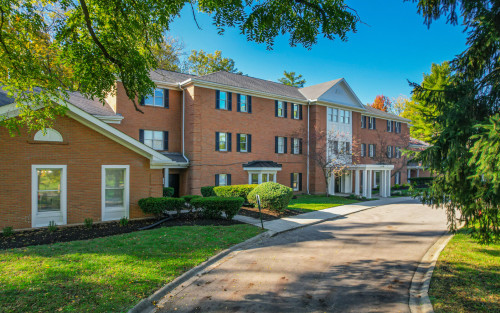
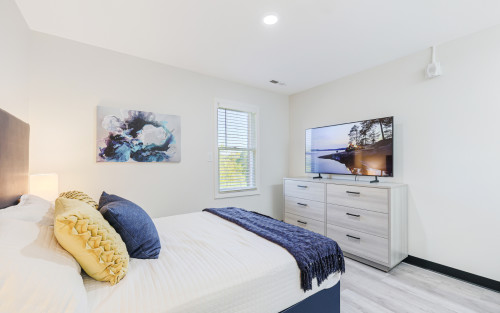
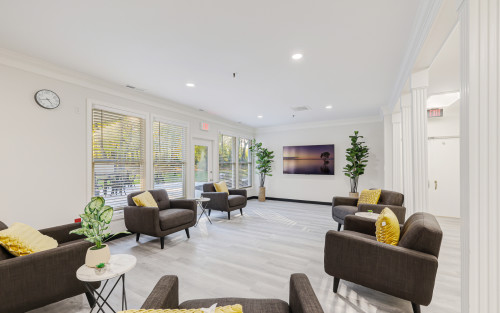
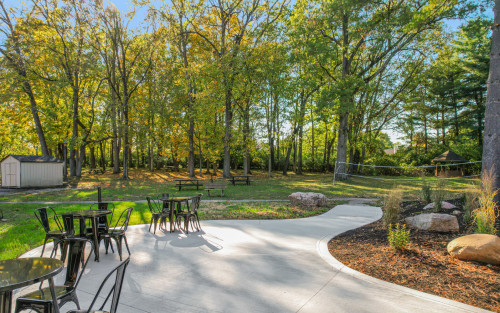
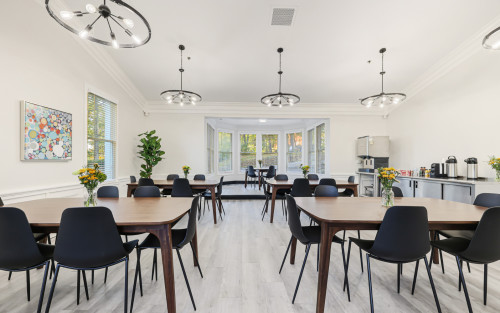




ReCreate Behavioral Health of Ohio
Verified Center
This provider's information has been quality-checked by Recovery.com's Research Team for accuracy and completeness, including center verification through appropriate third-party organizations.
Treatment Focus
This center treats substance use disorders and mental health conditions. You'll receive individualized care catered to your unique situation and diagnosis, learn practical skills for recovery, and make new connections in a restorative environment.
Primary Level of Care
Offering intensive care with 24/7 monitoring, residential treatment is typically 30 days and can cover multiple levels of care. Length can range from 14 to 90 days typically.
Treatment Focus
This center treats substance use disorders and mental health conditions. You'll receive individualized care catered to your unique situation and diagnosis, learn practical skills for recovery, and make new connections in a restorative environment.
Primary Level of Care
Offering intensive care with 24/7 monitoring, residential treatment is typically 30 days and can cover multiple levels of care. Length can range from 14 to 90 days typically.
Provider's Policy
Recreate Behavioral Health of Ohio is in network with Tricare, Cigna, Medical Mutual and Blue Cross Blue Shield. They also accept most major health insurance benefits and work with insurance providers to help cover the costs of your addiction treatment. They believe that finances should not be a barrier to receiving the life-changing help you deserve, and offer a seamless process for insurance verification.
ReCreate Behavioral Health of Ohio
ReCreate Behavioral Health of Ohio
About ReCreate Behavioral Health of Ohio
ReCreate Behavioral Health of Ohio, located in Gahanna, a welcoming suburb of Columbus, provides a comprehensive range of addiction and mental health services, tailored to meet individuals wherever they are on their recovery journey. From medically supervised detox and residential treatment to day programs (PHP), intensive outpatient programs (IOP), and outpatient care, ReCreate offers a seamless, supportive transition across every level of care. This full continuum allows clients to focus fully on healing without the stress of seeking treatment elsewhere. With a dedicated approach to both substance use disorders and mental health, including dual diagnoses, ReCreate is committed to coming alongside each client and personalizing their care.
Evidence-Based Treatment Approaches
At ReCreate Ohio, the treatment philosophy centers on evidence-based practices to help tackle the unique complexities of addiction and mental health disorders. Each client receives individualized therapy, laying a strong foundation for lasting recovery. Whether in detox, residential, or outpatient care, clients experience a mix of 1-on-1 and group therapy sessions focused on building coping skills, identifying relapse triggers, and encouraging deep self-reflection. Set in a serene residential environment, ReCreate offers a peaceful, non-clinical space that enhances the healing journey. This thoughtful blend of personalized care and proven therapeutic approaches reflects ReCreate Ohio's unwavering commitment to helping clients achieve meaningful, long-term recovery.
A Client-Centered Philosophy
ReCreate Ohio's approach is rooted in compassionate, client-centered care, where personalized treatment plans are at the heart of every recovery journey. The experienced team at ReCreate is committed to treating the whole person—focusing not just on the symptoms of addiction or mental health challenges, but on the deeper, underlying issues driving them. This holistic philosophy allows each individual’s path to recovery to be both comprehensive and transformative. In the supportive, understanding environment ReCreate is known for, clients are empowered to reclaim their lives, heal from within, and achieve lasting wellness. It’s more than treatment—it's a full-circle approach to recovery designed for lasting change.
Accessibility and Community Engagement
ReCreate Ohio understands that accessibility is often the key to successful recovery for many, which is why they partner with most major health insurance providers to make treatment affordable and within reach. Their streamlined insurance verification process helps eliminate financial barriers so that patients can focus fully on their healing. Beyond clinical care, ReCreate fosters lasting recovery through active community engagement, encouraging participation in 12-Step programs and peer support groups. This emphasis on building a strong support network is crucial for maintaining sobriety and mental health stability. Deeply committed to serving the Gahanna community and beyond, ReCreate Ohio offers high-quality, accessible care tailored to the diverse needs of individuals seeking recovery and lifelong wellness.

Highlights from the Center
Highlights
These highlights are provided by and paid for by the center.
1-on-1 Counseling
Customized Treatment Plans
Holistic Approach
Medically Assisted Detox
Center Overview
Treatment Focus
This center treats substance use disorders and mental health conditions. You'll receive individualized care catered to your unique situation and diagnosis, learn practical skills for recovery, and make new connections in a restorative environment.
Joint Commission Accredited
The Joint Commission accreditation is a voluntary, objective process that evaluates and accredits healthcare organizations (like treatment centers) based on performance standards designed to improve quality and safety for patients. To be accredited means the treatment center has been found to meet the Commission's standards for quality and safety in patient care.
Recently helped 6 people via Recovery.com
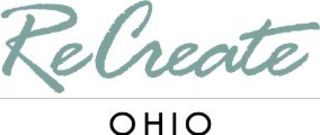
ReCreate Behavioral Health of Ohio
Recently helped 6 people via Recovery.com
Insurance Accepted
Cash Pay Rates
Estimated Cash Pay Rate
Center pricing can vary based on program and length of stay. Contact the center for more information. Recovery.com strives for price transparency so you can make an informed decision.




Recovery.com Verified Listing
Recovery.com verified that the name, location, contact information and license to operate for this treatment provider are valid and up-to-date.

Joint Commission Accredited
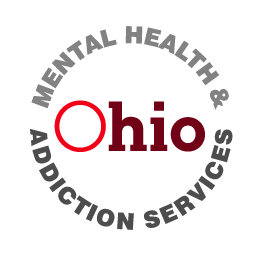
Licensed by Ohio
Recovery.com is an independent, third-party mental health resource. Verification does not imply endorsement and does not guarantee the quality of treatment services.
Meet Your Care Team

Daniel Schaffer
Chief Executive Officer

Amanda Timonere
Chief Clinical Officer
LMHC, NCC, CCMHC, MCAP

Alex Costa
Chief Marketing Officer

Liam McElwee
Chief Revenue Officer

Holynn Johnson
Director of Admissions

David Goloski
National Director of Alumni & Family Services

Christina Scherer
Family Services Advocate
Your Care Options
Specializations
Alcohol
Using alcohol as a coping mechanism, or drinking excessively throughout the week, signals an alcohol use disorder.
Anxiety
Anxiety is a common mental health condition that can include excessive worry, panic attacks, physical tension, and increased blood pressure.
Detox
Detox fully and safely removes toxic substances from the body, allowing the next steps in treatment to begin with a clean slate.
Benzodiazepines
Benzodiazepines are prescribed to treat anxiety and sleep issues. They are highly habit forming, and their abuse can cause mood changes and poor judgement.
Depression
Symptoms of depression may include fatigue, a sense of numbness, and loss of interest in activities. This condition can range from mild to severe.
Drug Addiction
Drug addiction is the excessive and repetitive use of substances, despite harmful consequences to a person's life, health, and relationships.
Opioids
Opioids produce pain-relief and euphoria, which can lead to addiction. This class of drugs includes prescribed medication and the illegal drug heroin.
Prescription Drugs
It's possible to abuse any drug, even prescribed ones. If you crave a medication, or regularly take it more than directed, you may have an addiction.
Who We Treat
Young Adults
Emerging adults ages 18-25 receive treatment catered to the unique challenges of early adulthood, like college, risky behaviors, and vocational struggles.
LGBTQ+
Addiction and mental illnesses in the LGBTQ+ community must be treated with an affirming, safe, and relevant approach, which many centers provide.
Men and Women
Men and women attend treatment for addiction in a co-ed setting, going to therapy groups together to share experiences, struggles, and successes.
Pregnant Women
Addiction and mental health treatment meets the clinical and psychological needs of pregnant women, ensuring they receive optimal care in all areas.
Professionals
Busy, high-ranking professionals get the personalized treatment they need with greater accommodations for work, privacy, and outside communication.
Veterans
Patients who completed active military duty receive specialized treatment focused on trauma, grief, loss, and finding a new work-life balance.
Treatment Services
Detox
Detox fully and safely removes toxic substances from the body, allowing the next steps in treatment to begin with a clean slate.
Licensed Primary Mental Health
Some primary care providers offer mental health diagnosis and treatment. This can prevent patients from developing more serious conditions.
Outpatient
During outpatient rehab, patients attend a structured treatment program while continuing to live at home.
Residential
In a residential rehab program, patients live onsite, with access to daily treatment and 24-hour care. An average stay is 30-90 days.
Approaches
Individual Treatment
Individual care meets the needs of each patient, using personalized treatment to provide them the most relevant care and greatest chance of success.
Medical
Medical addiction treatment uses approved medications to manage withdrawals and cravings, and to treat contributing mental health conditions.
Strengths-Based
Providers using a strengths-based philosophy focus on the positive traits of their patients, creating a positive feedback loop that grows confidence.
Therapies
1-on-1 Counseling
Patient and therapist meet 1-on-1 to work through difficult emotions and behavioral challenges in a personal, private setting.
Meditation & Mindfulness
A practiced state of mind that brings patients to the present. It allows them to become fully aware of themselves, their feelings, and the present moment.
Mindfulness Therapy
This ancient practice can be mental, emotional, and even spiritual. In meditation, you focus your attention on the present moment without judgement.
Art Therapy
Visual art invites patients to examine the emotions within their work, focusing on the process of creativity and its gentle therapeutic power.
Equine Therapy
Guided interactions with trained horses, their handler, and a therapist can help patients improve their self-esteem, trust, empathy, and social skills.
Family Therapy
Family therapy addresses group dynamics within a family system, with a focus on improving communication and interrupting unhealthy relationship patterns.
Conditions We Treat
Schizophrenia
Schizophrenia is a serious mental health condition that causes hallucinations, delusions, and disordered thinking.
Personality Disorders
Personality disorders destabilize the way a person thinks, feels, and behaves. If untreated, they can undermine relationships and lead to severe distress.
Anger
Although anger itself isn't a disorder, it can get out of hand. If this feeling interferes with your relationships and daily functioning, treatment can help.
Anxiety
Anxiety is a common mental health condition that can include excessive worry, panic attacks, physical tension, and increased blood pressure.
Bipolar
This mental health condition is characterized by extreme mood swings between depression, mania, and remission.
Codependency
Codependency is a pattern of emotional dependence and controlling behavior. It's most common among people with addicted loved ones.
Depression
Symptoms of depression may include fatigue, a sense of numbness, and loss of interest in activities. This condition can range from mild to severe.
Post Traumatic Stress Disorder
PTSD is a long-term mental health issue caused by a disturbing event or events. Symptoms include anxiety, dissociation, flashbacks, and intrusive thoughts.
Stress
Stress is a natural reaction to challenges, and it can even help you adapt. However, chronic stress can cause physical and mental health issues.
Substances We Treat
Alcohol
Using alcohol as a coping mechanism, or drinking excessively throughout the week, signals an alcohol use disorder.
Benzodiazepines
Benzodiazepines are prescribed to treat anxiety and sleep issues. They are highly habit forming, and their abuse can cause mood changes and poor judgement.
Chronic Relapse
Consistent relapse occurs repeatedly, after partial recovery from addiction. This condition requires long-term treatment.
Co-Occurring Disorders
A person with multiple mental health diagnoses, such as addiction and depression, has co-occurring disorders also called dual diagnosis.
Cocaine
Cocaine is a stimulant with euphoric effects. Agitation, muscle ticks, psychosis, and heart issues are common symptoms of cocaine abuse.
Drug Addiction
Drug addiction is the excessive and repetitive use of substances, despite harmful consequences to a person's life, health, and relationships.
Ecstasy
Ecstasy is a stimulant that causes intense euphoria and heightened awareness. Abuse of this drug can trigger depression, insomnia, and memory problems.
Heroin
Heroin is a highly addictive and illegal opioid. It can cause insomnia, collapsed veins, heart issues, and additional mental health issues.
Languages
Aftercare
Care Designed for Your Needs
Personal Amenities
Amenities
Special Considerations
Activities
Yoga
Yoga is both a physical and spiritual practice. It includes a flow of movement, breathing techniques, and meditation.

Recently helped 6 people via Recovery.com
Learn More About the Center
ReCreate Behavioral Health Network
Learn about ReCreate Ohio’s comprehensive network offering individualized treatment for addiction and mental health.
History and Experience
Read about the team’s years of experience in the behavioral health field.
Thorough Assessment
Discover how the team begins treatment for each client to ensure accurate diagnoses.
Aftercare and Support
Explore the aftercare options ReCreate Ohio offers.
What people are saying
Treatment
4.0
Accommodations
4.0
Food & Nutrition
3.0
Value
3.5
Anonymous
Reviewed 11/14/17
Review from Rehabs.com





